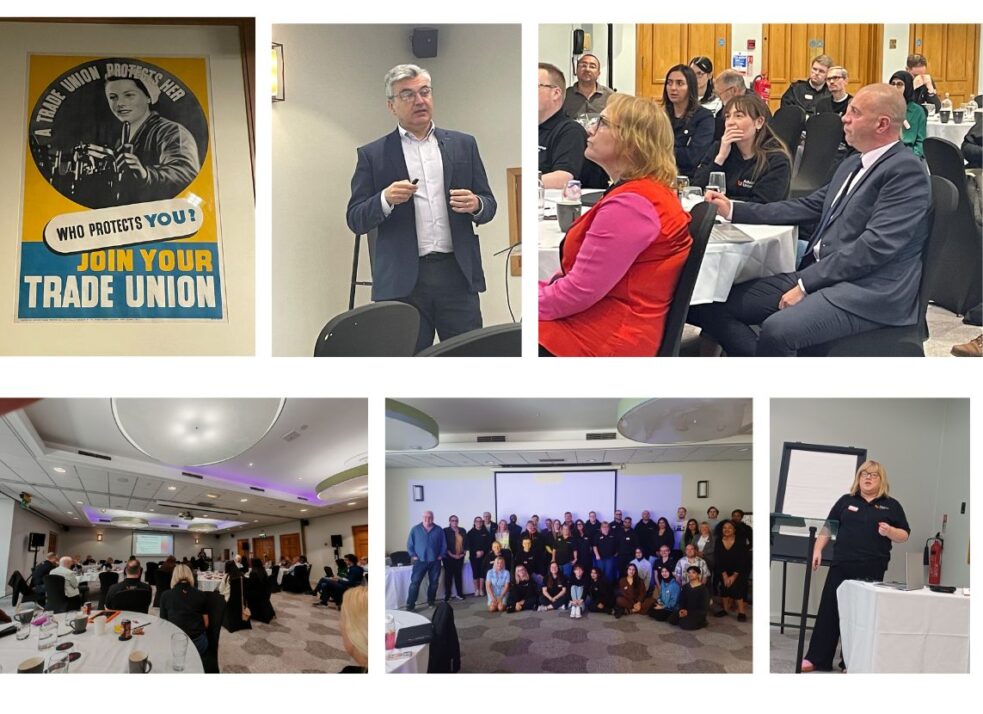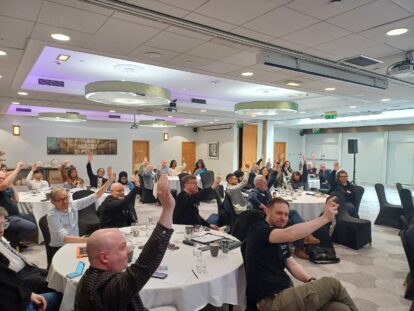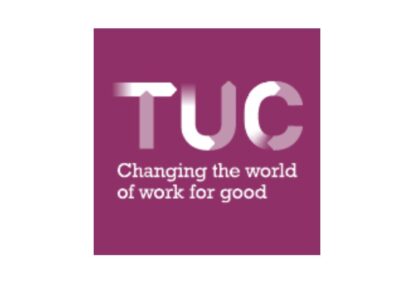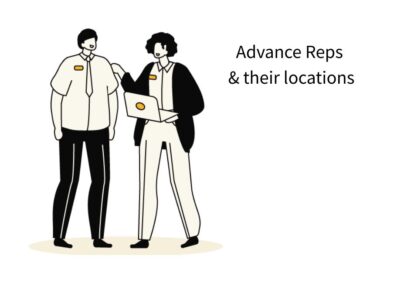
Advance Union 2025 Conference
On Monday, June 9th, we proudly hosted our Advance Conference in Manchester, a city steeped in the history of the trade union movement.
As the first President of Advance Union, I was incredibly proud to stand alongside Jim Leonard, with Keith Hoyland Deputy General Secretary and Nicola O’Shea, our Vice President.
This conference marked a historic first for Advance, as we embarked on new beginnings and a fresh start, guided by our improved values and a revised outlook with Jim Leoanrd as our General Secretary.
Personally, I felt a mix of nerves and excitement. This was my chance to put into action the very reasons I became a union rep: to help and develop other reps, empowering them to speak up, stand up for their beliefs, and improve working conditions across all our bank sites, offices, and branches.
Looking out at the room on Day 1, I was thrilled to see both familiar faces and new reps who have recently joined Advance Union. Their presence immediately put me at ease, knowing we had such a diverse group ready for a productive few days ahead.
Motions day was a cornerstone of this conference. We thoroughly debated every motion, sometimes agreeing and sometimes not, but always in a fair manner. The core aim was to provide a platform for our members to raise the issues that impact them daily, allowing us to lobby the bank effectively within our partnership agreement.
Throughout the days, we heard from key speakers, both from the bank and external organisations.
A personal highlight for me was Kate Bell, Assistant General Secretary of the TUC. She spoke with ease and candor, her insights resonating deeply with the workplace issues our members face every day.
Overall, the conference was a resounding success, and I extend my personal thanks to everyone who attended and stood firm in their beliefs.
Sinead Purse
President, National Executive Committee
Some of our Union Motions discussed at conference
Motion: Outsourcing and Offshoring
Conference notes:
- That Santander UK has made the regrettable decision to outsource and offshore roles.
- That, while the colleagues affected will keep their terms and conditions when their employment is transferred, some employers have indicated they will not recognise existing collective bargaining agreements with either of Santander’s recognised unions.
- Santander UK’s decision to outsource these roles has had a negative impact on the morale of its employees and has created uncertainty for many about their future job security.
Conference asserts:
- That outsourcing frequently leads to a degradation of contractual rights, and harms morale and can impact productivity within the remaining workforce.
- That colleagues affected by the bank’s decision to outsource these roles should not lose the collective bargaining rights that they benefited from because of being a member of one of Santander’s recognised trade unions.
Conference resolves:
- To push for formal union recognition for Santander workers where work is outsourced, working with other unions where appropriate.-
- To actively campaign against further outsourcing of roles at Santander UK.
Motion: Supporting Neurodiversity in the workplace
This Conference notes:
- The ongoing need for enhanced neurodiversity awareness and education within Santander, particularly for managerial roles.
- The significant financial and time-related barriers faced by employees seeking a diagnosis for neurodiversity traits.
This Conference believes:
- A more inclusive workplace benefits all employees and the bank.
- Proactive support for neurodiversity is a key component of a truly inclusive environment.
- Managers equipped with better neurodiversity understanding can foster more supportive teams.
This Conference therefore resolves:
- To call upon the General Secretary to collaborate with Santander to:
- Implement a comprehensive neurodiversity policy and enhanced training for managers.
- Explore and establish pathways to assist employees in accessing timely and affordable neurodiversity diagnostic services.
- To mandate the General Secretary to report back to the next Conference on progress made with Santander regarding these initiatives.
Motion: Championing Women’s Health – Expanding Santander UK’s Policy for Greater Support and Inclusion.
This Conference/Meeting notes:
- The positive step taken by Santander Bank in introducing a menopause policy, acknowledging a specific aspect of women’s health.
- That women’s health encompasses a far broader range of conditions and life stages beyond menopause, including, but not limited to, menstruation, endometriosis, polycystic ovary syndrome (PCOS), and other gynaecological and hormonal health issues.
- That these health issues can significantly impact an individual’s wellbeing, attendance, productivity, and overall experience in the workplace if not properly understood and supported.
- A current lack of comprehensive policy coverage and proactive support within Santander UK for these wider women’s health concerns.
- The importance of line manager awareness and training in creating a supportive and understanding environment for employees experiencing women’s health issues.
This Conference/Meeting believes:
- All employees experiencing women’s health issues have the right to a supportive, understanding, and accommodating work environment that empowers them to manage their health effectively while maintaining their productivity and career progression.
- A comprehensive Women’s Health Policy, extending beyond the current menopause provisions, is essential for fostering genuine inclusion, equity, and wellbeing for a significant portion of the workforce.
- That proactive promotion of such a policy and mandatory training for line managers are crucial for ensuring its effective implementation and for destigmatising conversations around women’s health in the workplace.
- Providing practical support such as considerations for menstrual leave, remote working options, reasonable adjustments, and flexible working arrangements can make a substantial positive difference to employees managing women’s health conditions.
- By implementing a leading Women’s Health Policy, Santander UK can enhance its reputation as an employer of choice, improve employee morale and retention, and support overall workforce productivity.
This Conference/Meeting resolves:
- To formally call upon Santander Bank to build on its current menopause policy into a comprehensive “Women’s Health Policy.”
- To demand that this expanded Women’s Health Policy explicitly addresses and provides support for a wider range of conditions, including but not limited to:
- Menstruation and menstrual health issues (e.g., heavy bleeding, severe pain).
- Endometriosis.
- Polycystic Ovary Syndrome (PCOS).
- Other significant gynaecological and hormonal health conditions.
- To insist that the new Women’s Health Policy includes clear provisions and guidance on:
- The possibility of menstrual leave or paid time off for severe symptoms.
- Enhanced access to remote working options where roles allow.
- A clear process for requesting and implementing reasonable adjustments to workstations, duties, or working patterns.
- Greater flexibility in working arrangements to help manage symptoms.
- To urge Santander Bank to commit to widely promoting the new Women’s Health Policy across the organisation to ensure all employees and managers are aware of its provisions.
- To call for the inclusion of comprehensive training on the Women’s Health Policy as a mandatory annual requirement for all Team Managers and line managers, ensuring they are equipped to support their staff effectively and sensitively.
- That Advance Union will actively engage with Santander UK in the development and refinement of this expanded policy to ensure it meets the needs of our members.
- To campaign for the successful implementation and ongoing monitoring of the Women’s Health Policy, gathering member feedback to ensure its effectiveness.
Motion: Site Strategy and retaining great talent
- A significant number of Advance Union members who are based in dual-location or non-central office sites possess a wealth of experience, skills, and knowledge.
- A perception and often a reality that job opportunities, particularly for promotion or specialised roles, are disproportionately concentrated in Unity Place.
- The current lack of clearly defined career development pathways and accessible job opportunities specifically tailored for, or inclusive of, members working in dual-location and regional sites.
- The resulting feelings among members in these locations are of being “forgotten,” undervalued, and having their career progression unfairly limited despite their contributions and experience.
- Modern technology and evolving work practices should enable greater flexibility in where roles can be based, challenging traditional assumptions about the necessity of physical presence in a central location for all roles.
- The risk of losing valuable, experienced staff from regional and dual-location sites if their development needs and career aspirations are not adequately addressed.
This Conference/Meeting believes:
- That all Advance Union members, regardless of their primary work location, deserve equitable access to job opportunities, career development, and the chance to utilise their full potential.
- That diverse geographical representation at all levels of an organisation, including senior and specialised roles, brings valuable perspectives and strengthens the business.
- That employers have a responsibility to actively foster talent and provide clear progression routes for employees in all their operational sites, not just central hubs.
- Failing to provide opportunities for dual-location and regional staff is a missed opportunity for employers and detrimental to member morale and engagement.
- That Advance Union must proactively champion the cause of members in these sites to ensure their skills are recognised and their career prospects are enhanced.
- Where this is not possible, the bank assists with travel or relocation costs.
This Conference/Meeting resolves:
- To make the promotion of equitable job opportunities and career development pathways for members in dual-location and regional sites a key campaigning and negotiating priority for Advance Union.
- To direct the General Secretary to engage with all relevant employers, particularly those with significant dual-location or regional footprints, to:
- Conduct a joint review of current recruitment and promotion practices to identify and address any systemic bias against candidates from non-central locations.
- Actively explore and promote the creation of more roles that can be performed effectively from dual or multiple locations, or fully based in regional sites, including managerial and specialist positions.
- Develop and implement transparent career development frameworks and mentorship programmes that are fully accessible and beneficial to employees in all locations.
- Ensure that training and development opportunities necessary for career advancement are equally available and accessible to staff, regardless of their site.
- To explicitly ensure that when colleagues are at risk, adjustments are made to consider dual location and regional offices where practical and for Santander to fund temporary travel allowance or relocation costs where appropriate to retain regional talent where face-to-face interaction is essential.
- To call on Santander to explicitly advertise and designate a greater number of vacancies as open to “dual-location,” “hybrid (any primary site),” or “regional site-based” candidates, reflecting a genuine commitment to location flexibility, particularly as an alternative to redundancy, and loss of talent.
- To campaign for Santander to continue to invest in the necessary technology and infrastructure to fully support effective remote and cross-site collaboration, thereby removing barriers to basing more diverse roles outside of central locations.
- To provide Advance Union representatives with specific training and resources to support members in dual-location and regional sites in accessing development opportunities and challenging unfair practices.
- To actively gather and publicise success stories of members who have progressed their careers from regional or dual-location sites, and to highlight best practices from employers who effectively support geographically diverse talent.
- That the National Executive will regularly report back to members on progress made in negotiations and campaigns related to this issue















